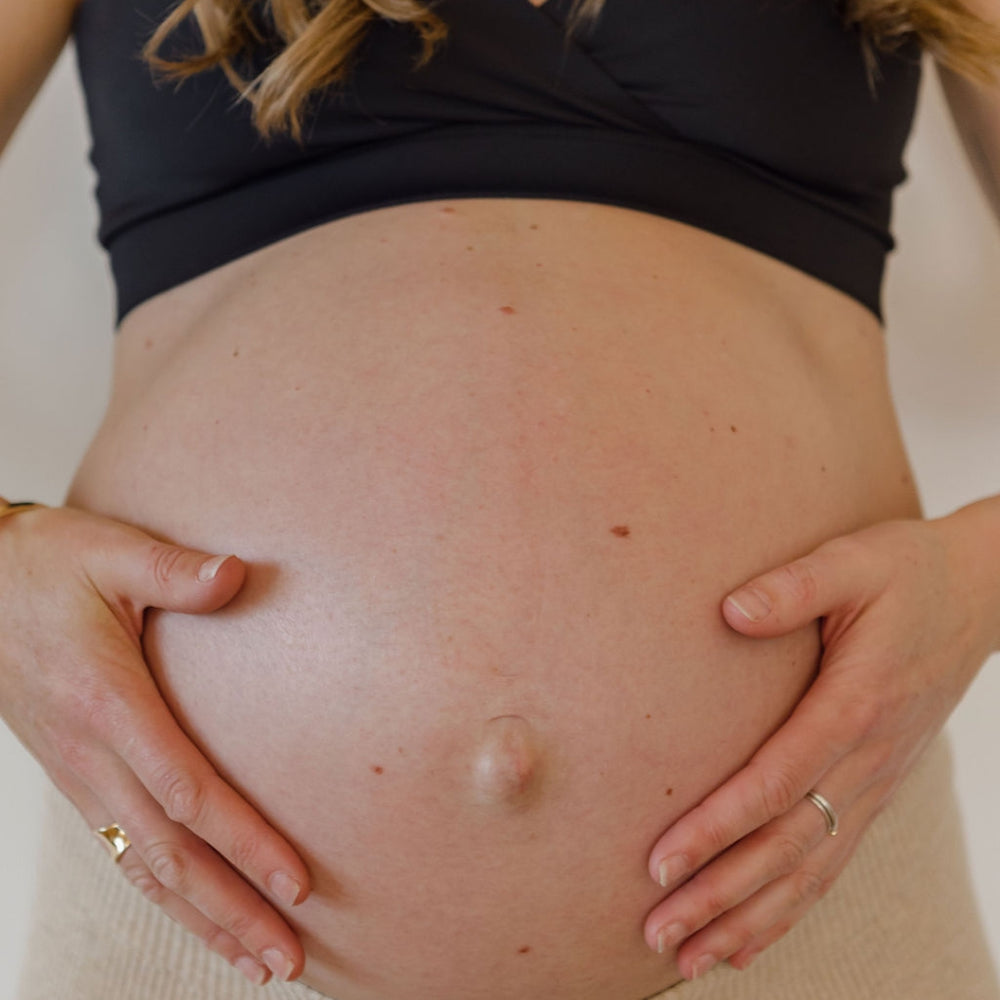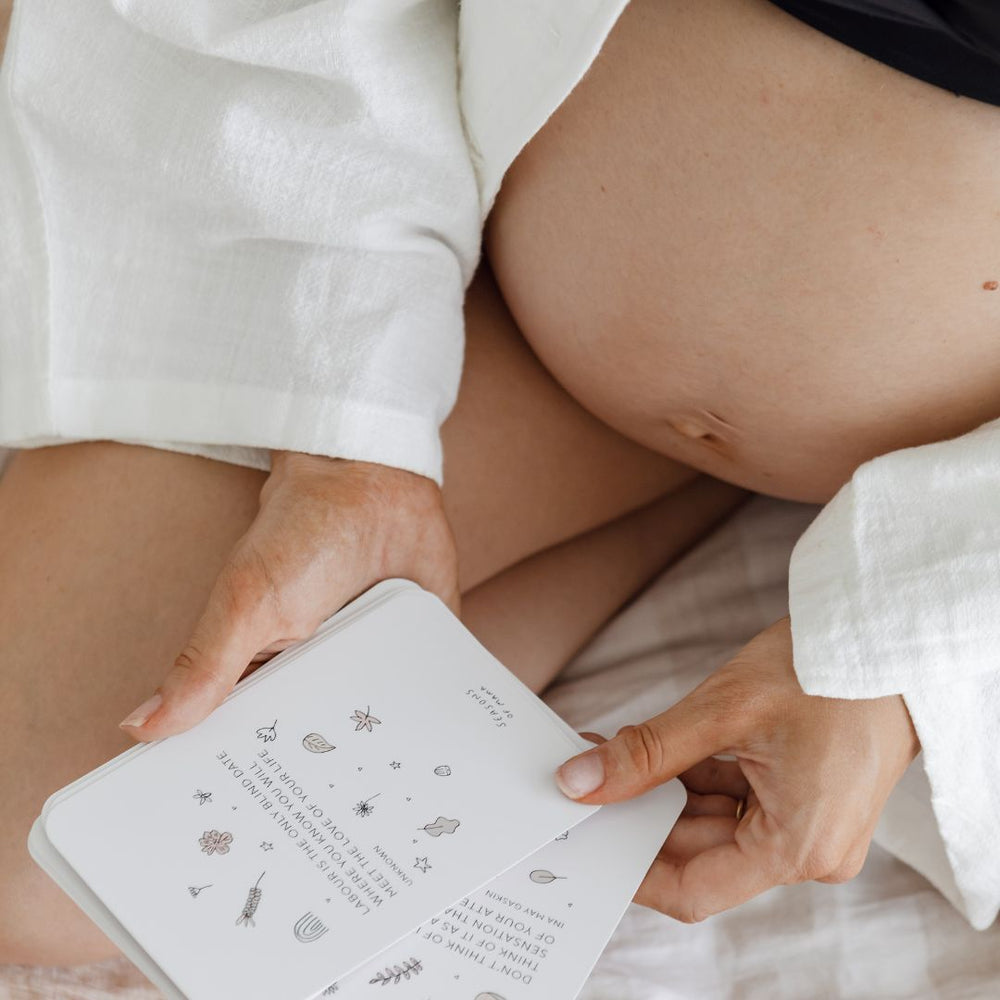Congratulations mama-to-be, you’re on a journey that’s going to change your life. You’re growing a little human.
Finding out you’re pregnant can be a whirlwind of emotions, whether it’s your first pregnancy, a miracle pregnancy, or you’ve gone through it all before. The first thing to do is take a step back and breathe. Live in the moment. And then, when you’re ready, it’s time to start getting prepared for all the biglittlethings that are coming your way.
But remember that everyone is on their own journey and no two pregnancies are the same. So if you’re worried that this doesn’t sound like the path you’re on, that’s ok. Make sure you keep in touch with your pregnancy medical care team and chat with your village (family & friends) for the support you need.
How long does the first trimester last?
The first trimester is typically considered your first 12 weeks of pregnancy. It begins on the first day of your last period (usually the marker used to date how many weeks pregnant you are) and goes all the way up to the end of week 12.
The chances are you likely won’t find out that you’re pregnant until five or six weeks in, so the first trimester can sometimes feel shorter than the second and third. Which is good news if you’re starting to feel first-trimester symptoms like nausea and exhaustion as your body gets used to growing a baby.

What are common first-trimester symptoms?
First-trimester symptoms can come and go, and you may find that you have good and bad days, and good and bad weeks. As your body starts getting ready to house its new resident/s for the next 9 months, your hormones are going to be wreaking havoc on your regular bodily functions. The two most common symptoms you might experience are morning sickness and tiredness.
Exhaustion or even feeling faint or dizzy after minimal activity (mental or physical) might start playing around with your regular schedules. Rest when and where you can and cut back on the exercise for now if you need to. One of the new pregnancy lessons you’re about to learn is that you can only do what you can do, when you can do it.
You’ll also likely discover that the name morning sickness is a misnomer. Nausea can come and go at any stage of the day, not just in the morning. Around 70% of women experience morning sickness during their first trimester. The good news is that for most women, this usually clears up somewhere between the 12-16 week mark, and there are anti-nausea medications available.
But for 2% of pregnant women, severe nausea and vomiting can be a sign of Hyperemesis Gravidarum (HG). If you’re finding that constant nausea and vomiting are starting to interfere with your day-to-day life, chat with your doctors and midwives about the possibility that you may have HG. You can find out more at Hyperemesis Australia or familiarise yourself with other stories on the You, Me & HG podcast.
The important thing to remember during the first trimester is that you’re doing a good job. Do what you can, only eat what you can (when and if you can), and be kind to yourself when your body might not be so kind to you.

What actually happens in the first trimester?
Your body is about to go through a whirlwind of changes during pregnancy, and if this is your first time around, they may begin earlier than you might think. What’s more, your little bub is going to be doing a lot of developing of their own over the coming weeks. So what develops during the first trimester?
Although even the thought of breastfeeding is still months away, you may find that your breasts are tender or swollen, you have sore or sensitive nipples, and your areolas are increasing in size at a surprising rate. Staying hydrated is more important than ever as your body increases blood volume by nearly 50% over the course of your pregnancy. And even if you’re not ‘showing’ yet (that baby bump you’re looking forward to will likely not become noticeable until closer to the end of the first trimester), you may find that your stomach begins to tighten and your abdomen feels more rounded towards the top.
Most of the growth in your uterus during the first trimester will be the placenta rather than bub, but that doesn’t mean that development of bones, organs, and the brain isn’t happening. Now is a good time to chat with your pregnancy care team about what pregnancy supplements you should be taking (if you’re not already).

What should you avoid during the first trimester?
Your pregnancy care team will be able to instruct you more on what you should be doing during your first trimester, or sometimes more importantly, what you shouldn’t be doing.
The most common question we hear is what can’t you eat while you’re pregnant? Most of this comes down to foods with a high risk of listeria, such as deli meats and soft cheeses, but there are other foods that you might not have heard of, such as food from salad bars or even rockmelon. Take a look at an online guide, like this one from the NSW Food Authority, for what foods may or may not be safe during pregnancy.
The way you sleep might have to change as well. Research shows that you can modify or even halve your risk of stillbirth by sleeping on your side, rather than on your back. Either side is generally considered fine, so this might be a good habit to get into earlier rather than later.
And if you had travel plans during your first trimester, the good news is that first-trimester travel is generally considered safe. However, the risk of deep vein thrombosis (DVTs) is higher during pregnancy, particularly for flights longer than four hours, so make sure you chat with your medical team about your specific circumstances. And if the exhaustion and nausea feel like too much, you may find that you don’t want to travel anyway. Just do what’s right for you.

Remember, if it doesn’t feel right, trust your gut
Although it might not seem like it, common symptoms like nausea, exhaustion, having no appetite or libido, and even some faintness can all be signs of a healthy pregnancy in the first trimester, and that your body is doing what it needs to do throughout your pregnancy. But one of the most important lessons we can teach you is to remember that if it doesn’t feel right, trust your gut.
Potential danger signs of pregnancy in the first trimester could be vaginal bleeding, severe nausea and vomiting (which could be a sign of something more serious like HG), or extreme cramps. While some spotting or bleeding can occur through the first trimester, it can be scary knowing how much to expect. So don’t hesitate to contact your GP or even a late-night doctor hotline if you’re concerned. They’ll be able to chat with you about what you can expect, or when it might be time to go to the hospital for a check up.

How is first-trimester screening done?
There’s nothing quite like the feeling of seeing your bub on the ultrasound or hearing their heartbeat for the first time. Your medical journey may look a bit different, but here’s a quick guide to what scans or tests you can expect, or opt-into, during your first trimester.
Initial Blood Tests (around 5-6 weeks)
If you’ve returned a positive pregnancy test, your GP may send you off for some bloodwork. This may be to triple check you are pregnant, get an idea of your iron levels, or if you haven’t already, check for things like Rubella immunity or Hep B.
Dating Scan (usually between 7-10 weeks)
Want to know your baby’s due date? You might have calculated this off the first day of your last period, but a dating scan will be able to pinpoint this with more accuracy based on bub’s current size.
Combined First Trimester Screening Test (between 9-13 weeks)
Combined screening is used during the first trimester to identify a pregnancy with an increased risk of Down Syndrome or Edward Syndrome. It’s usually an optional test with an out-of-pocket expense and is made up of two parts: a blood test between 9 and 13 weeks, and an ultrasound between 11 and 13 weeks.
Non-Invasive Pre-Natal Testing or NIPT (10+ weeks)
Another optional and out-of-pocket blood test, NIPT is usually more accurate than Combined First-Trimester Screening and looks at baby's DNA to give more information about the risk of conditions like Down Syndrome, as well as some predispositions to potential genetic disorders. And if you’re not after a surprise, you’ll also be able to use this genetic testing to find out the gender of your little one.
First-trimester ultrasound (between 10-13 weeks)
If you’ve skipped all the above screening processes and are yet to see your little one, the chances are you’ll be booked into an ultrasound towards the end of the first trimester. Depending on the size or position of bub, this can be transvaginal or external over the belly. Your GP will also likely chat with you about where you’re planning on having your baby prior to this test, or what pregnancy care you want to go through, as this is a good opportunity for them to refer you to any hospitals or clinics (public or private) for the duration of your pregnancy.

Partner support in the first trimester
For dads and partners, there’s not much you can do during the first trimester other than offer a world of support. Particularly when mum is feeling not quite like herself, supporting her around the home or with work, drawing a bath, or taking care of the kids can all do wonders to take off her mental load. It’s also important to know where mum wants your support at appointments or ultrasounds, as you don’t want to miss out on that first glimpse of bub!
Your first trimester can be an equally exciting and emotional time but remember mama-to-be, you’ve got this. Surround yourself with a supportive village and never be afraid to speak with medical professionals or seek a second opinion if you need.

ALL IMAGES ARE OWNED BY BIGLITTLETHINGS STUDIO PTY LTD.



